Sports
/ArcaMax
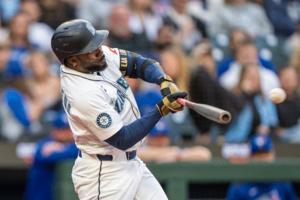
Blue Jays erase 3-run deficit to end Mariners' series winning streak
SEATTLE — All they can do now is salvage.
The Seattle Mariners, so stout for so long, find themselves in unfamiliar territory entering Sunday’s series finale against the Toronto Blue Jays. The only objective now is simply trying to avoid a sweep.
The Blue Jays rallied from a three-run deficit and pulled away for a 6-3 victory Saturday ...Read more

Orioles buried early, never sniff comeback in 5-2 loss to Angels
ANAHEIM, Calif. — If the Baltimore Orioles had any momentum carrying over from their uplifting win over the Angels on Friday night, it was gone by the end of the first inning.
Baltimore (14-24) fell into an early hole and never dug itself out in a 5-2 loss to the Angels on Saturday night. Kyle Gibson didn’t record an out past the fourth ...Read more

Padres relentless in 21-0 rout of Rockies
DENVER — It is something of a silly notion to assume a team will sweep a series.
This is the big leagues.
Right?
“I’m not big (on) ‘Win all three games.’ I’m more take care of business today,” Padres manager Mike Shildt said. “This is Major League Baseball. Coming in and winning a major league game is what we strive and ...Read more

Ranger Suárez returns to form in Phillies' 7-1 win over Guardians
CLEVELAND — With two out in the seventh inning Saturday, everyone at Progressive Field — including players from both teams — gazed up at the 221-foot wide video screen in left field and pretended to be umpires.
Was José Ramírez safe at second base? Did Trea Turner tag him on the hand? Was the tying run in scoring position, or was the ...Read more

Garrett Crochet, Red Sox blow out Cole Ragans, Royals in 10-1 win
Hours after the Boston Celtics rebounded from a frustrating loss – two, in fact – with a 115-93 win over the New York Knicks, the Red Sox did the same.
Whereas Friday night’s series opener in Kansas City was a scoreless stalemate until the 11th, Saturday was only a low-scoring affair for the home team. The Red Sox blew out the Royals 10-1...Read more

Mets' Brett Baty hits 2 homers, but Tylor Megill's May struggles lead to loss vs. Cubs
NEW YORK — It’s almost like clockwork. Every April, Tylor Megill is lights-out through the month of April, but once the calendar turns to May, the right-hander turns into a different pitcher.
It wasn’t exactly the worst start for Megill on Saturday night against the Chicago Cubs, but he didn’t exactly look like he did in April in the ...Read more
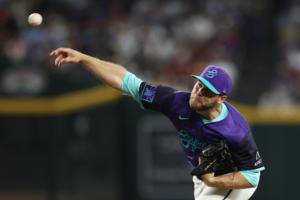
Dodgers hot streak against Cy Young winners ends during loss to Diamondbacks
PHOENIX — The Dodgers were a perfect 5-0 this season when facing former Cy Young Award winners.
On Saturday night at Chase Field, however, they finally met their match.
Despite missing his last scheduled start because of shoulder inflammation, Corbin Burnes had his way with the Dodgers’ powerhouse lineup in a 3-0 win for the Arizona ...Read more
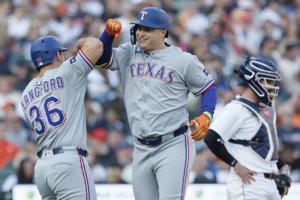
Rangers slug four homers off Jack Flaherty, snap Tigers' five-game win streak
DETROIT — Jack Flaherty knows the formula for his own success. He’s certainly demonstrated it enough over the course of his career, especially last season when he helped the Dodgers win the World Series.
He even talked about it on Friday.
“Do the small things right,” he said. “Control the zone, make pitches and don’t complicate too...Read more

Twins drop Giants, 2-1, thanks to Joe Ryan's arm and Trevor Larnach's bat
MINNEAPOLIS — It’s hard to tell which recovery is more impressive: Joe Ryan’s or the Twins’. Either way, Ryan provided ample evidence Saturday that both are healthy again.
Ryan, floored by an “intense” bout of the flu earlier this week that delayed his scheduled Thursday start by two days, allowed just two hits and one run over six ...Read more
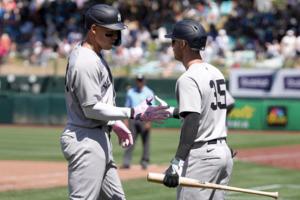
Yankees waste late comeback, 2 Aaron Judge homers in loss to A's
Two solo home runs from Aaron Judge and a go-ahead homer from Oswald Peraza weren’t enough for the Yankees to pull off a comeback win on Saturday, as they fell to the Athletics, 11-7.
The Yankees put themselves up 6-4 with a five-run sixth, but that lead was quickly erased after some catchable balls off the bats of Brent Rooker and Tyler ...Read more
The Blue Jays are in Seattle. But the Canadians, not as much.
SEATTLE — It is a rite of summer in Seattle, as sure as Seafair and salmon season — when the Toronto Blue Jays come to town, their Canadian fans will follow.
Summer after summer, they have come, from Saskatoon, Edmonton, Victoria; converging on downtown, ambling along the waterfront, drowning out Mariners fans and turning T-Mobile Park into...Read more
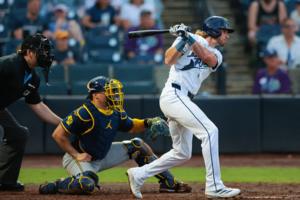
Rays wait through delay but make it worth it with a walk-off win
TAMPA, Fla. — The novelty angle to Saturday’s game was the weather delays — one that pushed back the start and another during the fifth inning — that were billed as the first for home games in franchise history.
The more important storyline was the dramatic way the Rays won, especially after it looked like they were headed toward a loss...Read more
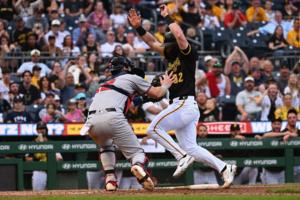
Pirates unable to finish comeback effort, fall to Braves in 11 innings
PITTSBURGH — Less than 24 hours after benefiting from some manager Don Kelly magic, the Pirates returned to their losing ways Saturday afternoon at PNC Park, falling to the Atlanta Braves by a final score of 3-2 in 11 innings.
Atlanta started the scoring in the top of the second when Michael Harris II doubled home Sean Murphy to make the ...Read more
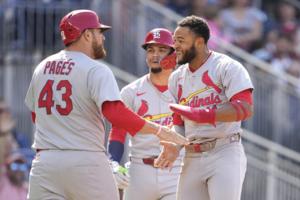
Cardinals run winning streak to 7 as Andre Pallante conjures another stingy start
WASHINGTON — An opportunistic offense that conjured four runs in the second inning followed by another starter’s wizardry proved plenty for the Cardinals to continue their hex on the Washington Nationals on Harry Potter Day at the ballpark.
Lumos, Cardinals.
In a week, they’ve pulled a winning streak out of their hats.
Led by starter ...Read more
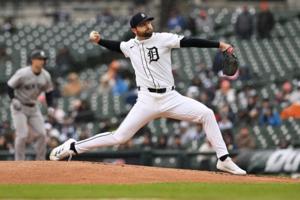
Tigers put Casey Mize on 15-day IL with 'mild' left hamstring strain; Chase Lee back up
DETROIT — Casey Mize, off to the best start of his career, will have to hit pause.
Detroit Tigers manager AJ Hinch announced before the game Saturday that Mize was placed on the 15-day injured list dating to Friday with a mild left hamstring strain.
“In his last inning in Colorado (Thursday), he felt a sensation or a tweak and everybody ...Read more
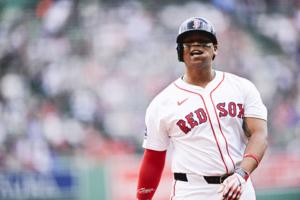
Mac Cerullo: Rafael Devers missing opportunity to lift Red Sox up
BOSTON — It seemed as though everyone had moved on.
Rafael Devers moving from third base to designated hitter was the story of spring training. The slugger made no attempt to hide his unhappiness and at one point even said he wouldn’t be willing to do it, but eventually the change was made and after a historically bad first week he settled ...Read more
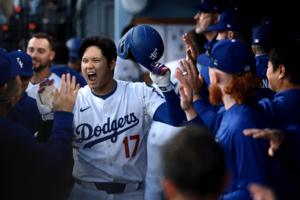
Bill Shaikin: Agent Nez Balelo 'wouldn't do anything different' with Shohei Ohtani's $700 million deal
LOS ANGELES — The business of sports often is cloaked in secrecy. You can find out the salary of your favorite player, but how much money his team makes and how much money he makes off the field are the stuff of estimates, not public discourse.
Not on Thursday, though. Is Shohei Ohtani really making more than $100 million this year in ...Read more

Angels' hitters stifled by Tomoyuki Sugano in loss to Orioles
ANAHEIM, Calif. — Just when the Angels’ hitters were starting show some signs of life, Tomoyuki Sugano showed up and shut them down.
After scoring 18 runs in the previous three games and providing some hope that their three three-week offensive malaise was over, the Angels managed just four hits in a 4-1 loss to Sugano and the Baltimore ...Read more
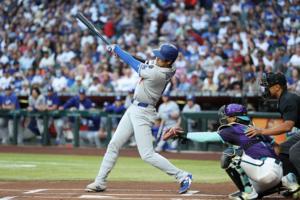
Shohei Ohtani home run caps wild ninth-inning comeback in Dodgers' win over Arizona
PHOENIX — The roof was open. The air was hot. And in a stadium already known as a hitter’s paradise, the Los Angeles Dodgers and Arizona Diamondbacks teed off on each other in a Chase Field classic.
There were lead changes and sudden momentum shifts. Line-drive rockets and towering no-doubt blasts. The ejection of Dodgers pitching coach ...Read more
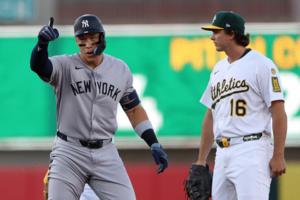
Jasson Domínguez becomes youngest Yankee with three-homer game in win over A's
Jasson Domínguez made New York Yankees history.
In Friday night’s 10-2 win over the A’s in West Sacramento, Domínguez became the youngest player in franchise history to hit three home runs in a game, according to MLB stat guru Sarah Langs.
Domínguez is 22 years and 91 days old.
The switch-hitting Domínguez struck a solo home run off ...Read more
Popular Stories
- Bill Shaikin: Agent Nez Balelo 'wouldn't do anything different' with Shohei Ohtani's $700 million deal
- Jasson Domínguez becomes youngest Yankee with three-homer game in win over A's
- Shohei Ohtani home run caps wild ninth-inning comeback in Dodgers' win over Arizona
- Tigers put Casey Mize on 15-day IL with 'mild' left hamstring strain; Chase Lee back up
- Paul Sullivan: White Sox embracing their newest superfan, Pope Leo XIV -- while trolling the Cubs





